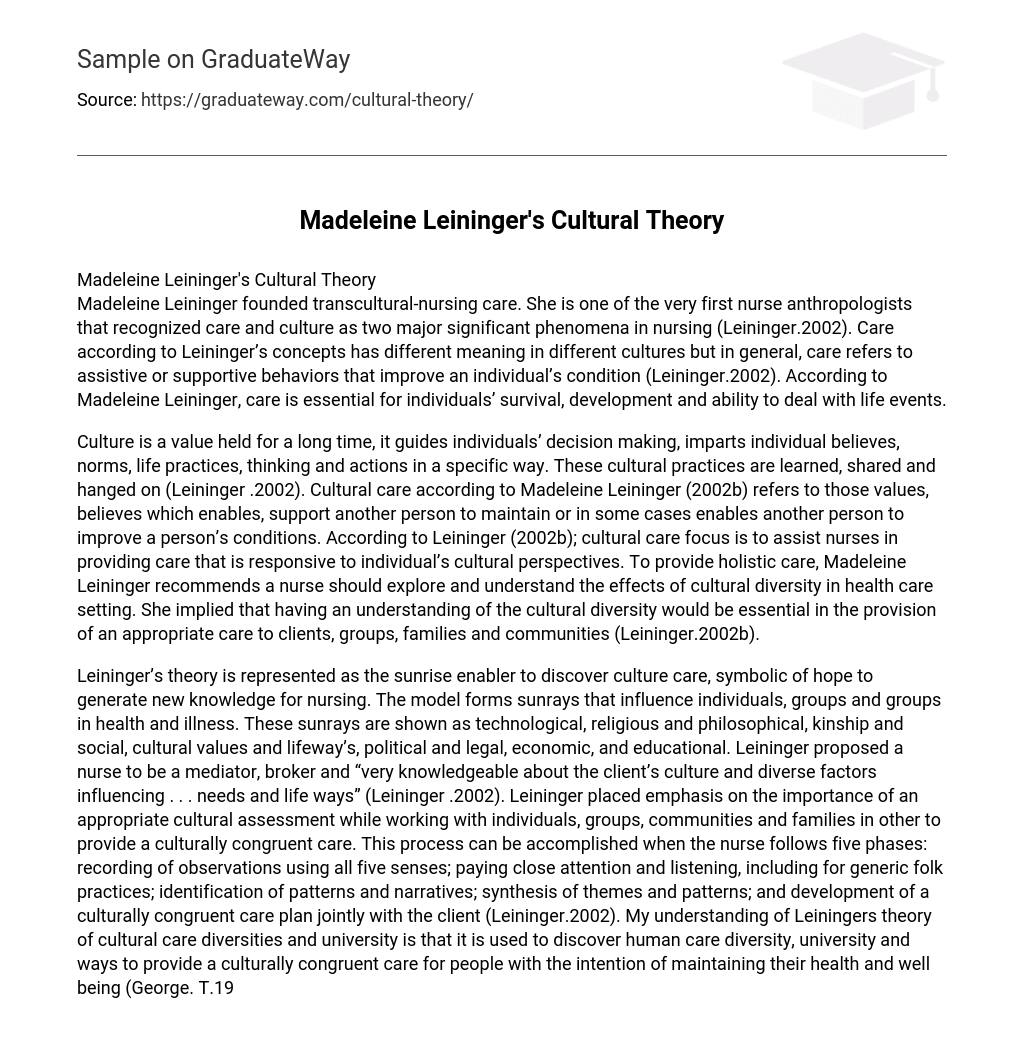Madeleine Leininger is the founder of transcultural nursing care. As one of the earliest nurse anthropologists, she acknowledged the importance of care and culture in nursing (Leininger.2002). In Leininger’s concepts, care holds varying meanings across different cultures, but generally, it encompasses supportive behaviors that enhance an individual’s well-being (Leininger.2002). Leininger emphasizes that care is crucial for an individual’s survival, development, and coping with life’s challenges.
Culture is a longstanding value that influences people’s decision-making, shapes their beliefs, norms, practices, thinking, and actions in a distinct manner. These cultural practices are acquired, shared, and preserved (Leininger .2002). According to Madeleine Leininger (2002b), cultural care encompasses the values and beliefs that empower and assist individuals in maintaining or enhancing their well-being.
Leininger (2002b) suggests that cultural care focus helps nurses provide care that is responsive to individuals’ cultural perspectives. In order to offer holistic care, it is recommended by Madeleine Leininger that nurses should explore and understand the impact of cultural diversity in healthcare settings. She implies that having an understanding of cultural diversity is crucial for providing appropriate care to clients, groups, families, and communities (Leininger, 2002b).
Leininger’s theory serves as a catalyst for uncovering culture care, bringing hope and fostering new insights in nursing. The model consists of various influential elements, which include technology, religion, philosophy, kinship, society, cultural values, politics, legality, economy, and education. According to Leininger (2002), a nurse should take on the roles of mediator, broker, and possess extensive knowledge about the client’s culture and the various factors that impact their needs and way of life.
Leininger emphasized the importance of conducting a cultural assessment to provide culturally congruent care when working with individuals, groups, communities, and families. The nurse can achieve this by following five phases: recording observations using all five senses, paying close attention and listening (including for generic folk practices), identifying patterns and narratives, synthesizing themes and patterns, and developing a culturally congruent care plan in collaboration with the client (Leininger.2002). In my understanding of Leininger’s theory of cultural care diversities and universality, it is used to explore the diversity of human care and find ways to provide culturally congruent care in order to maintain the health and well-being of individuals (George. T.1998).
Leininger (2002) suggested that gathering information about the significance of care entails understanding clients’ perspectives on care through attentive listening for their expressions of care ideas. In her transcultural study, George (1998) highlighted the challenge of providing culturally congruent nursing care to chronically mentally ill clients and their subculture due to a lack of knowledge and understanding.
Therefore, in her study, the cultural care theory guided her to explore the care significance, manifestation, and encounter of the chronically mentally ill within an American community. In a transcultural research conducted by Joanne Therese Hrscher Ehrmm in 1998, Leininger’s theory of nursing, which encompasses cultural diversity and universality, was employed as a conceptual framework to uncover the care meaning and experiences of substance-dependent African-American women using the three modalities.
Insufficient comprehension of clients’ experiences and beliefs impedes the provision of culturally appropriate care for substance-dependent African-American women, as stated by the author. This dearth of culturally relevant care can adversely affect their health and well-being. Research indicates that numerous substance-dependent African-American women resort to substance abuse as a means of coping with distressing life circumstances (Ehrmin, J. T. 1998).
Madeleine Leininger, a nurse researcher, acknowledged the significance of culture in comprehending individual health perspectives, values, behaviors, or practices. She devised the theory of transcultural care as a crucial realm within nursing science. I believe the origins of her theory of cultural care stem from her practical experience as a nurse working with diverse cultures. Leininger emphasized that providing culturally sensitive care is the core of nursing and distinct to the profession (Leininger.2002).
References
- Ehrmin, J. T. (1998). Culture Care:Meaning and Expression of African-American Women Residing in an inner City Transitional Home for Substance Abuse. ProQuest Dissertion and Theses;1998;ProQuest Nursing and Allied Health Sources pg.n/a.
- George, T. B. (1998). Meaning, Expression and Experiences of Care of Chronically Mentally Ill in a Day Treatment Center using Leininger’s Cultural Care Theory. ProQuest Dissertion and Theses;1998;ProQest Nursing & Allied Health Sources pg.n/a.
- Leininger, M. M. (2002b). Culture care assessments for congruent competency practice. In M. Leininger & M. McFarland (Eds.), Transcultural nursing: Concepts, theories, research, and practice (3rd ed.pp. 117–143). New York, NY: McGraw-Hill Companies.





